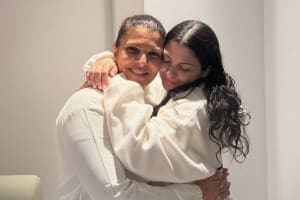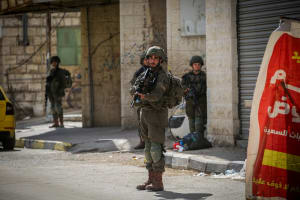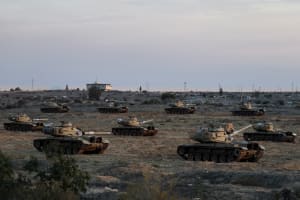Passover - A bittersweet remembrance

Passover, the freedom festival Jewish people celebrate every spring, is central to the Jewish faith. Every year, Jews tell the 3,300-year-old story of the Exodus while holding a seder (order) meal with family and friends. They read through the Haggadah (the telling) and recount how God dramatically delivered Israel from slavery and took them to be his own people, later giving them the Torah upon which all Western civilization is built.
In Exodus chapter 12, God commands the Jewish people to observe Passover and The Feast of Unleavened Bread. "This is a day you are to commemorate; for the generations to come you shall celebrate it as a festival to the LORD--a lasting ordinance…Celebrate the Feast of Unleavened Bread, because it was on this very day that I brought your divisions out of Egypt. Celebrate this day as a lasting ordinance for the generations to come.”
The Haggadah tells us we’re to celebrate Passover as if we ourselves were personally enslaved and set free.
As Jewish people across the globe celebrate Passover this year in the aftermath of October 7, while 133 hostages remain in captivity, there will be no need to imagine ourselves in ancient times to identify with the sufferings of our people-we need only recall the past six months.
This Passover, before we light the candles at the beginning of our seder, we will light a special memorial candle for those who are no longer with us and those who were killed by the evil of terrorism.
When we dip the bitter herbs into salt water to remember the bitter tears of slavery, we’ll cry for the ones still being held captive in Gaza. We’ll think of Shiri Bibas with her four-year-old son, Ariel and baby Kfir, whose joy of motherhood and innocence of childhood were stolen by terrorists. We’ll think of Chaim Peri, an artist who turned 80 and Amiram Cooper who turned 85 in Gaza, whose family members still don’t know if they're dead or alive.
When we break the middle matzah, we will remember that we too are broken.
As we listen to the story of our ancestors who cried out under the oppression of slavery and suffering, the pleading voice of 87-year-old Holocaust survivor, Ruth Haran, will ring in our ears, recounting the unthinkable nightmare she experienced all over again when Hamas terrorists murdered her son and kidnapped her grandchildren and great-grandchildren.
When we mix the bitter herbs with the sweet apple and nut mixture called charoset, our hearts will be filled with bittersweet memories of Passovers gone by with loved ones around the table sharing and singing, and we’ll remember those with empty seats and broken hearts this Passover.
When our children ask us, “What does this Passover ceremony mean to you?” and “Why is this night different than all other nights?”, we’ll think of 1,200 Israelis who were murdered on October 7, 253 people who were taken into captivity and how Jewish people everywhere were traumatized that day.
We’ll remember children and families in the Middle East who have been oppressed by evil terror regimes and caught up in a war they didn’t want. We’ll remember the 14 million Ukrainians forced to leave their homes since the Russian invasion. We’ll remember the sufferings of our people down through the ages from the crusades… to the pogroms… to the Holocaust... to October 7.
Like our children, we too will ask, “Why?”
When we tell the story of Passover, we’ll remember how God lovingly gave us the blood of the lamb so he could “pass over” our homes when he struck the firstborn of Egypt.
"On that same night I will pass through Egypt and strike down every firstborn--both men and animals--and I will bring judgment on all the gods of Egypt. I am the LORD.”
Then, in all our remembering, we will remember what was spoken long ago through the prophet Isaiah,
“He was despised and rejected by mankind,
a man of suffering, and familiar with pain.
Like one from whom people hide their faces
he was despised, and we held him in low esteem.
Surely he took up our pain
and bore our suffering,
yet we considered him punished by God,
stricken by him, and afflicted.
But he was pierced for our transgressions,
he was crushed for our iniquities;
the punishment that brought us peace was on him,
and by his wounds, we are healed.
We all, like sheep, have gone astray,
each of us has turned to our own way;
and the Lord has laid on him
the iniquity of us all.
He was oppressed and afflicted,
yet he did not open his mouth;
he was led like a lamb led to the slaughter,
and as a sheep before its shearers is silent,
so he did not open his mouth.
By oppression and judgment, he was taken away.
Yet who of his generation protested?
For he was cut off from the land of the living;
for the transgression of my people, he was punished.” Isaiah 53:3-8
Then, our hearts will be comforted, and we will find hope. Like David, we will say:
“The Lord works righteousness
and justice for all the oppressed.
He made known his ways to Moses,
his deeds to the people of Israel.
The Lord is compassionate and gracious,
slow to anger, abounding in love.
He will not always accuse,
nor will he harbor his anger forever;
he does not treat us as our sins deserve
or repay us according to our iniquities.
For as high as the heavens are above the earth,
so great is his love for those who fear him;
as far as the east is from the west,
so far has he removed our transgressions from us.” Psalm 103:6-12
This year, even in the face of unthinkable tragedy, we will still celebrate the Passover, praying for God’s redemption all over again, and say with even more longing, “L’Shana Haba’ah B’Yerushalayim!” (Next Year in Jerusalem!)
-(1).jpg)
Avigayil Rivkah is a writer and speaker on the Jewish roots of the Christian faith, Jewish culture and Israel news. She is a Jewish believer in Jesus and writes at ajoyfuljewishjourney.com













